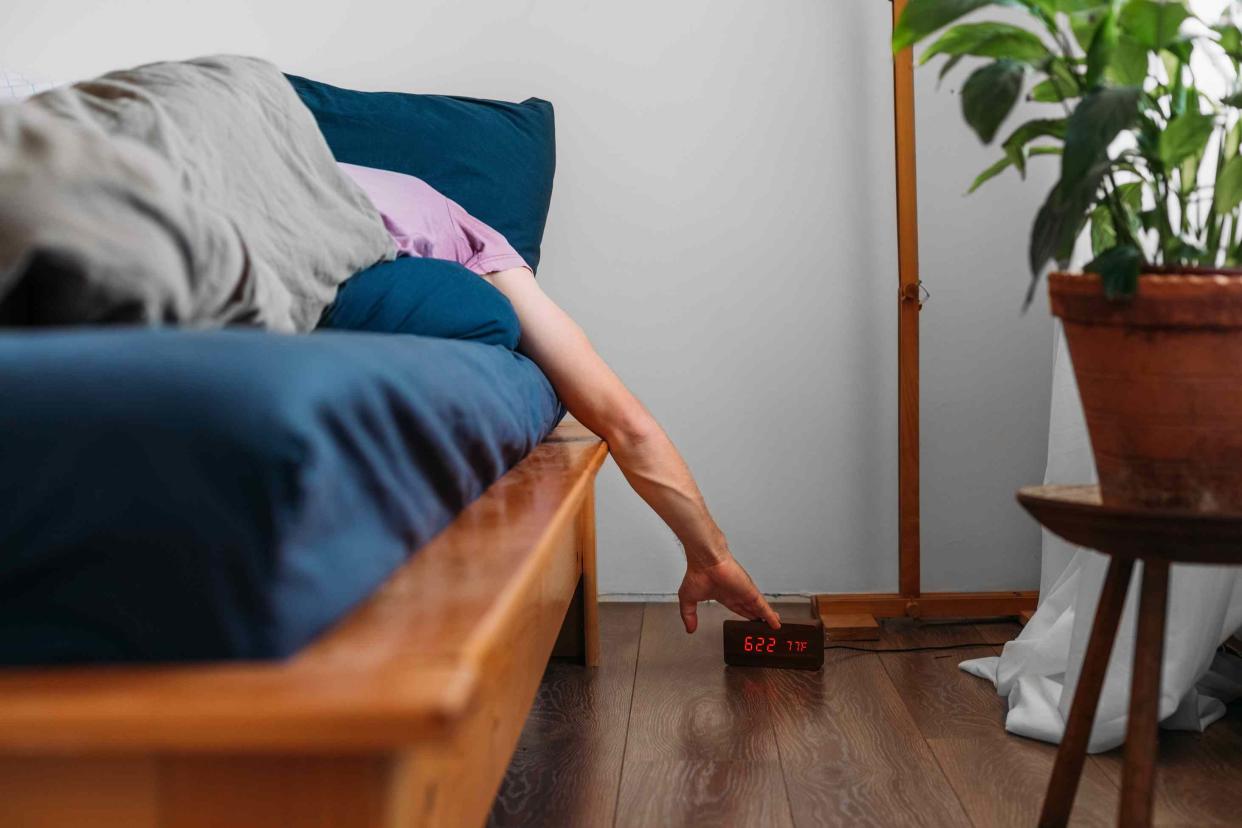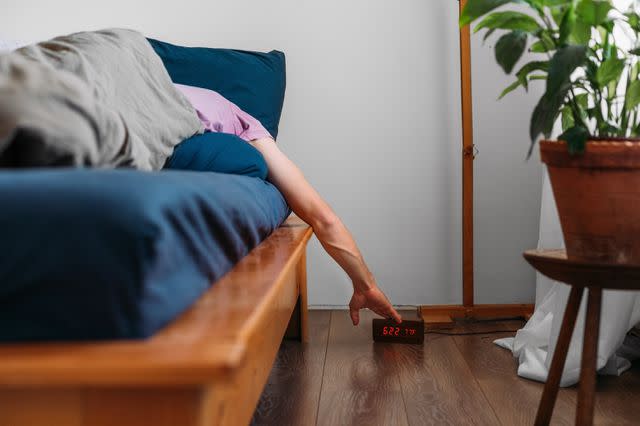What Really Happens to Your Body When You Hit Snooze?

Studio Firma/Stocksy
Fact checked by Nick Blackmer
Hitting the snooze button each morning for a few more minutes of sleep may not be the healthiest thing you can do for your sleep hygiene.
While hitting snooze isn't dangerous, it could be a sign of a larger issue, like sleep deprivation and any underlying issues that may not be letting a person fully rest at night.
To help avoid hitting the snooze button, experts recommend placing your alarm clock further away from your bed so you have to physically get up to turn it off.

Studio Firma/Stocksy
Getting out of bed in the mornings can be tough, and more often than not, you may be tempted to hit the snooze button to sneak in a few extra minutes of sleep. But experts say the habit may not necessarily be the healthiest one.
Hitting snooze can disrupt a person’s sleep cycle, but more concerning, it could be an indicator that someone is suffering from an even bigger issue: sleep deprivation.
“The fact that you need an alarm in and of itself tells you that you’re probably skimping on the amount of sleep your body needs,” Sunjay Kansagra, MD, professor of child neurology and sleep medicine at Duke University Health, told Health. “If you feel so sleepy that you need to hit the snooze button, that’s another sign that tells you that you are probably skimping [on sleep] much more than you should.”
Related:How To Fall Asleep When You’re Too Stressed To Sleep
Snoozing May Interrupt Sleep Cycles
Pressing snooze on an alarm does allow the body to get back to sleep, Dr. Kansagra explained, though those extra minutes may not actually be that helpful.
When a person’s alarm clock goes off in the morning, they may be woken up from rapid eye movement (REM) sleep, Dr. Kansagra said. REM sleep typically happens later on in a person’s sleep—this is when the brain is active and people often dream.
But once someone’s been woken up from REM sleep, Dr. Kansagra added, they may fall back into a lighter sleep.
“[The next few minutes of sleep] may not be as refreshing as if you were to spend those minutes in deeper sleep,” he said.
There is a chance that someone could fall back into REM sleep after snoozing their alarm, said Patrick Fuller, PhD, neurologist and professor of neurological surgery at UC Davis Health. But even continuing in deeper sleep while snoozing presents some issues.
“You might throw yourself, for example, back into a REM cycle,” Fuller told Health. “It’s very confusing to the brain—you wake up foggy, disoriented.”
This could be linked to a phenomenon called sleep inertia, which is that feeling of grogginess, disorientation, or slower thinking that many people experience after waking up in the morning or from a longer nap.
Researchers are still trying to come to a conclusion about the relationship between sleep inertia and depth of sleep. But waking up from a deeper sleep may lead to greater sleep inertia, or grogginess—in a study of mice and rats, researchers found that neurons were “off” or slower to fire when waking up from REM sleep versus non-REM sleep.
As a result, pressing snooze repeatedly may actually make someone feel more disoriented and tired after they get out of bed, Fuller said.
Though it can have an interesting impact on people’s sleep cycles, it’s still unclear how snoozing might affect the body’s circadian rhythm, which controls blood pressure, metabolism, body temperature, and more. One study found that people who snoozed had a higher resting heart rate, more research is needed to expand on this possible link.
If a person has the extra time to hit the snooze button in the morning, Dr. Kansagra said, the healthier option would be to simply get up with one alarm instead of multiple.
“Just set your alarm to the latest possible time you can wake up,” he said. “That way you’ve guaranteed yourself getting as much sleep as possible that’s better quality, rather than having to hit the snooze button multiple times.”
Related:Study: Too Little or Too Much Sleep May Increase Your Chance of Infection
A Sign of a Larger Issue
Though snoozing may not be part of an ideal part of a person’s sleep routine, Fuller said, it’s certainly not dangerous.
The real concern with pressing the snooze button frequently is that it’s likely a symptom of a much larger issue.
Though it may seem improbable, experts agreed that in a perfect world, people shouldn’t even need an alarm clock to wake up in the morning. They should rather wake up naturally once the body has gotten as much sleep as it needs.
“The issue isn’t so much the alarm clock and the snooze button itself, it’s that you’re sleep deprived and you just need to get more sleep,” said Fuller.
And this is, unfortunately, quite common. In one study just over half of people—about 57%—reported needing multiple alarms to get out of bed in the mornings. And about one in three American adults aren’t getting enough sleep, with almost 40% saying they fall asleep during the day without meaning to at least once a month.
There are still many questions surrounding snoozing and how it affects health long term. But the data on sleep deprivation is clear—it’s been linked to type 2 diabetes, depression, obesity, and heart disease, and it can create dangerous situations while people are driving or working.
Related:The Latest Downfall of Not Getting Enough Sleep? It May Make You Selfish
Finding a Healthier Wake-Up Routine
Even though there’s nothing inherently dangerous about hitting the snooze button, feeling like it’s impossible to get out of bed in the morning is a wake up call that you may be sleep deprived and at greater risk for a host of other health issues.
Fixing sleep deprivation requires good sleep in two categories, Dr. Kansagra explained—quantity and quality.
Generally speaking, adults should be getting between 7 and 9 hours of sleep each night. But if someone’s hitting those targets and still feeling tired, that’s not necessarily a bad thing.
“Everybody’s sleep need is genetically determined and you can’t really change it unfortunately,” Dr. Kansagra said. “You have to get the amount of sleep that your body naturally needs.”
That number may also fluctuate as someone goes throughout life—seniors generally need less sleep, and children and teens need much more.
In addition to quantity, Dr. Kansagra said it’s important that the sleep a person is getting is actually good quality, too.
Being unable to get out of bed even after sleeping for a recommended amount of hours could indicate that a person is struggling with a sleep disorder, such as sleep apnea or restless leg syndrome, or another health issue that’s bothering them as they try to sleep, such as allergies or arthritis, he added. That’s a good time to consult a sleep medicine specialist.
In general, a restful night’s sleep also requires following all the basics of good sleep hygiene. These include keeping the room comfortable, cool, and dark, avoiding light exposure, caffeine, alcohol, or other substances before bed, and maintaining a consistent bedtime and wake up routine, Fuller and Dr. Kansagra said.
And using an alarm clock is certainly okay—if nothing else, just for peace of mind—but Fuller said it’s best to keep it across the room so that a person is less tempted to hit snooze and fall back asleep.
“Get the full sleep that you need,” Dr. Kansagra said. “The best indication of that is waking up in the morning feeling fully refreshed, not consistently needing an alarm or needing to snooze, and not needing any substances to help you feel awake during the day.”
For more Health news, make sure to sign up for our newsletter!
Read the original article on Health.

